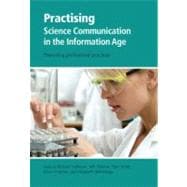
Note: Supplemental materials are not guaranteed with Rental or Used book purchases.
Purchase Benefits
What is included with this book?
| Abbreviations and Acronyms | p. ix |
| Biographies of Contributors | p. x |
| Introduction to the Volume | p. xv |
| Communicating post-academic science | p. 1 |
| Scientists communicating | p. 3 |
| Ethical codes and scientific norms: the role of communication in maintaining the social contract for science | p. 19 |
| Patents and the dissemination of scientific knowledge | p. 35 |
| Developing trends in scientists' communicating | p. 51 |
| Science communication across disciplines | p. 53 |
| Communicating physics in the information age | p. 67 |
| Accessing contemporary science | p. 81 |
| Science and the online world: realities and issues for discussion | p. 83 |
| From print to online: developments in access to scientific information | p. 98 |
| Consensus and controversy | p. 113 |
| Peer review in science journals: past, present and future | p. 115 |
| Controversy and consensus | p. 131 |
| Popularizing science | p. 149 |
| Where do books fit in the information age? | p. 151 |
| Science communication in fiction | p. 166 |
| Speaking to the world: radio and other audio | p. 178 |
| Practising public engagement | p. 193 |
| The development of Our Dynamic Earth | p. 195 |
| Engaging through dialogue: international experiences of Café Scientifique | p. 209 |
| Final Reflections | p. 227 |
| Index | p. 231 |
| Table of Contents provided by Ingram. All Rights Reserved. |
The New copy of this book will include any supplemental materials advertised. Please check the title of the book to determine if it should include any access cards, study guides, lab manuals, CDs, etc.
The Used, Rental and eBook copies of this book are not guaranteed to include any supplemental materials. Typically, only the book itself is included. This is true even if the title states it includes any access cards, study guides, lab manuals, CDs, etc.